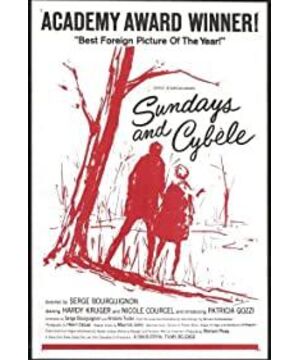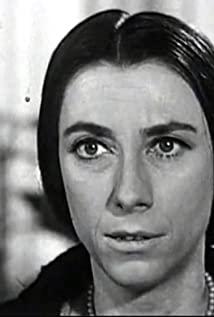However, beauty is fragile. Just like that angel's tender smile, like a dream, when he thought he could hold it, he instantly disappeared into the dark and greedy desire.
Serge Bognon is a director with considerable achievements and ideas in the artistic and narrative aspects of films. Not only the picture is exquisite, the story is exquisite, but the emotion is also very delicate. Now it seems that directors like him are rare, and it is more precious to appreciate them.
When watching this "Flowers Falling Yingti Spring", the first thing to do is to get rid of the lingering influence of "A Tree of Pears and Begonias". These are two works with completely different concepts and impressions. If Lolita is a naive snake of "temptation", Sibelle is an angel who has fallen into the mortal world.
The film is about a 30-year-old middle-aged man who is infatuated with a 12-year-old girl, unable to extricate himself, and finally ends up with the tragic ending of Guanghua's death. Fortunately, the people who accompany him still love him, and those who want to take away the beautiful jealousy from him have not finally realized their attempts. When Sybel woke up from her coma, looking sadly at Pierre's body and shouting "I don't have a name anymore", does it mean a kind of beautiful sinking?
It's hard to speculate on Serge Bognon's mood when he created this work, but judging from the works presented in front of the audience, the director's mood must be quite complicated and mainly heavy. . Therefore, when dealing with characters, light and shadow, dialogue, conflict are tangled and tangled, and shadows float.
It's like the play between Pierre and Sibel in the light of the light, like a dream on the floating cloud, and Pierre himself can't believe it is true. Another example is the wine glass he raised when he and his girlfriend attended a friend's wedding. The distorted face reflected by the curvature of the glass and the light looked funny and ugly. It was the reality that he hated more and more escaping.
The director enriched the language of the shots with his skillful shooting skills and unique shooting techniques, and used the changes of light and shadow to imply the floating of the characters' psychology. For audiences who like to ponder the language of shots, every shot, every line of dialogue, every picture, every layer of light and shadow in "Flowers Falling and Yingti Spring" has its place worth interpreting.
Perhaps, this is the charm of the master. Serge Bognon's talent is not only manifested in the control of shooting, but also in the delicate handling of emotions, which is admirable.
One is a middle-aged man who is deeply beaten and has a weird personality, the other is a tragic girl who lacks both emotion and family, and two characters who are not parallel because of an accidental encounter, completely changed each other's lives. For the earth-shaking change in the heart, the director only used emotional intercourse similar to love for "calm" treatment. However, behind this seemingly calm, undercurrent of ugliness is surging, waiting for an opportunity to break all the good at any time.
Emotional ups and downs also erupted in this. The fragile diaosi class is doing turbulent things, encountering the scrutiny of social groups, and is destined to end in tragedy.
Not sure if this is the cry of the director, but in the film, we can see his pessimism about beauty. Tragedy is always higher than the aesthetic taste of comedy, but not all tragedies are worthy of praise. The story of "Flowers Falling Yingting Ting Chun" ended too suddenly, and the audience's tangled heart ended before they let go. It is hard to say whether it can bring a greater shock effect, but it is a cunning means to make the audience unforgettable.
It seems, in the director's shrewdness and the ending's cunning, that everything in the film is nearly perfect. However, the script that is too eager to express the dream of glass is still a little too hard on the dialogue, which makes the whole picture that can be called beautiful with a hypocritical color. This is a small flaw in the film.
Overall, it's a good fairy tale. To sum it up in a sentence from Yukio Mishima, no matter how low a wave hits the shore, it will break. The scorched stone of moral judgment stands there, and it is unknown how many pretty loli and strange sluts were killed. However, these ambiguous corpses will still enter the sea with the tide and become a new layer of waves, continuing to shatter the sadness on the shore.
View more about Sundays and Cybèle reviews











